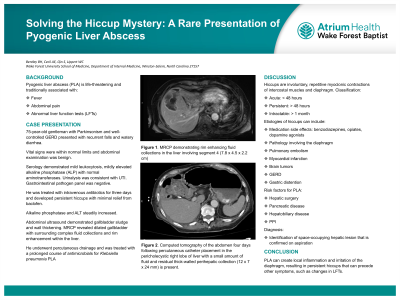Tuesday Poster Session
Category: Liver
P4698 - Solving the Hiccup Mystery: A Rare Presentation of Pyogenic Liver Abscess
Tuesday, October 29, 2024
10:30 AM - 4:00 PM ET
Location: Exhibit Hall E

Has Audio
- BB
Blake Bentley, MD
Wake Forest University School of Medicine
Winston-Salem, NC
Presenting Author(s)
Blake Bentley, MD1, Alexa Cecil, MD, MPH2, Sunny Qin, MD1, William Lippert, MD, MPH2
1Wake Forest University School of Medicine, Winston-Salem, NC; 2Atrium Health Wake Forest Baptist, Winston-Salem, NC
Introduction: Pyogenic liver abscess (PLA) is a life-threatening condition characterized with fever, abdominal symptoms, and abnormal liver function tests (LFTs), requiring prolonged courses of antimicrobials and drainage. We present a patient whose primary symptoms were hiccups and abnormal LFTs.
Case Description/Methods: A 75-year-old man with Parkinsonism and well-controlled gastroesophageal reflux disease (GERD) presented with recurrent falls and intermittent episodes of watery diarrhea. Vital signs were normal with a benign abdominal exam. Initial serology demonstrated a mild leukocytosis; elevated alkaline phosphatase (ALP) with normal aminotransferases; urinalysis consistent with urinary tract infection; and negative for gastrointestinal pathogens. For three days, he was treated with intravenous antibiotics during which he developed persistent hiccups with minimal relief from baclofen and a steady rise in his LFTs. Abdominal ultrasound demonstrated gallbladder sludge and wall thickening concerning for acute cholecystitis. Subsequent MRCP revealed a dilated gallbladder with internal debris and surrounding complex fluid collections with rim enhancement in the liver itself. He underwent percutaneous drainage and was treated with prolonged course of antimicrobials for Klebsiella pneumoniae PLA.
Discussion: Hiccups are involuntary, repetitive myoclonic contractions of intercostal muscles and the diaphragm and are classified as acute (< 48 hours), persistent ( > 48 hours) and intractable ( > 1 month). The underlying etiologies include medication side effects (e.g., benzodiazepines, opiates, dopamine agonists), pathology involving the diaphragm, pulmonary embolism, myocardial infarction, brain tumors, GERD, gastric distention, among others.
Risk factors for PLA may include hepatic surgery, pancreatic disease, hepatobiliary disease, and use of proton pump inhibitors. Diagnosis of PLA is established by identifying a space-occupying hepatic lesion on imaging followed by aspiration. If left untreated, the mortality of PLA can approach 12%. Percutaneous drainage combined with antibiotics is generally preferred to surgical drainage as it is less invasive.
We propose our patient’s PLA created local inflammation and irritation of the diaphragm, resulting in persistent hiccups. This case shows the importance of thorough investigation with persistent hiccups and newly elevated LFTs. Additionally, patients with K. pneumoniae PLA are recommended to undergo colonoscopy due to increased risk of malignancy.
Disclosures:
Blake Bentley, MD1, Alexa Cecil, MD, MPH2, Sunny Qin, MD1, William Lippert, MD, MPH2. P4698 - Solving the Hiccup Mystery: A Rare Presentation of Pyogenic Liver Abscess, ACG 2024 Annual Scientific Meeting Abstracts. Philadelphia, PA: American College of Gastroenterology.
1Wake Forest University School of Medicine, Winston-Salem, NC; 2Atrium Health Wake Forest Baptist, Winston-Salem, NC
Introduction: Pyogenic liver abscess (PLA) is a life-threatening condition characterized with fever, abdominal symptoms, and abnormal liver function tests (LFTs), requiring prolonged courses of antimicrobials and drainage. We present a patient whose primary symptoms were hiccups and abnormal LFTs.
Case Description/Methods: A 75-year-old man with Parkinsonism and well-controlled gastroesophageal reflux disease (GERD) presented with recurrent falls and intermittent episodes of watery diarrhea. Vital signs were normal with a benign abdominal exam. Initial serology demonstrated a mild leukocytosis; elevated alkaline phosphatase (ALP) with normal aminotransferases; urinalysis consistent with urinary tract infection; and negative for gastrointestinal pathogens. For three days, he was treated with intravenous antibiotics during which he developed persistent hiccups with minimal relief from baclofen and a steady rise in his LFTs. Abdominal ultrasound demonstrated gallbladder sludge and wall thickening concerning for acute cholecystitis. Subsequent MRCP revealed a dilated gallbladder with internal debris and surrounding complex fluid collections with rim enhancement in the liver itself. He underwent percutaneous drainage and was treated with prolonged course of antimicrobials for Klebsiella pneumoniae PLA.
Discussion: Hiccups are involuntary, repetitive myoclonic contractions of intercostal muscles and the diaphragm and are classified as acute (< 48 hours), persistent ( > 48 hours) and intractable ( > 1 month). The underlying etiologies include medication side effects (e.g., benzodiazepines, opiates, dopamine agonists), pathology involving the diaphragm, pulmonary embolism, myocardial infarction, brain tumors, GERD, gastric distention, among others.
Risk factors for PLA may include hepatic surgery, pancreatic disease, hepatobiliary disease, and use of proton pump inhibitors. Diagnosis of PLA is established by identifying a space-occupying hepatic lesion on imaging followed by aspiration. If left untreated, the mortality of PLA can approach 12%. Percutaneous drainage combined with antibiotics is generally preferred to surgical drainage as it is less invasive.
We propose our patient’s PLA created local inflammation and irritation of the diaphragm, resulting in persistent hiccups. This case shows the importance of thorough investigation with persistent hiccups and newly elevated LFTs. Additionally, patients with K. pneumoniae PLA are recommended to undergo colonoscopy due to increased risk of malignancy.
Disclosures:
Blake Bentley indicated no relevant financial relationships.
Alexa Cecil indicated no relevant financial relationships.
Sunny Qin indicated no relevant financial relationships.
William Lippert indicated no relevant financial relationships.
Blake Bentley, MD1, Alexa Cecil, MD, MPH2, Sunny Qin, MD1, William Lippert, MD, MPH2. P4698 - Solving the Hiccup Mystery: A Rare Presentation of Pyogenic Liver Abscess, ACG 2024 Annual Scientific Meeting Abstracts. Philadelphia, PA: American College of Gastroenterology.
